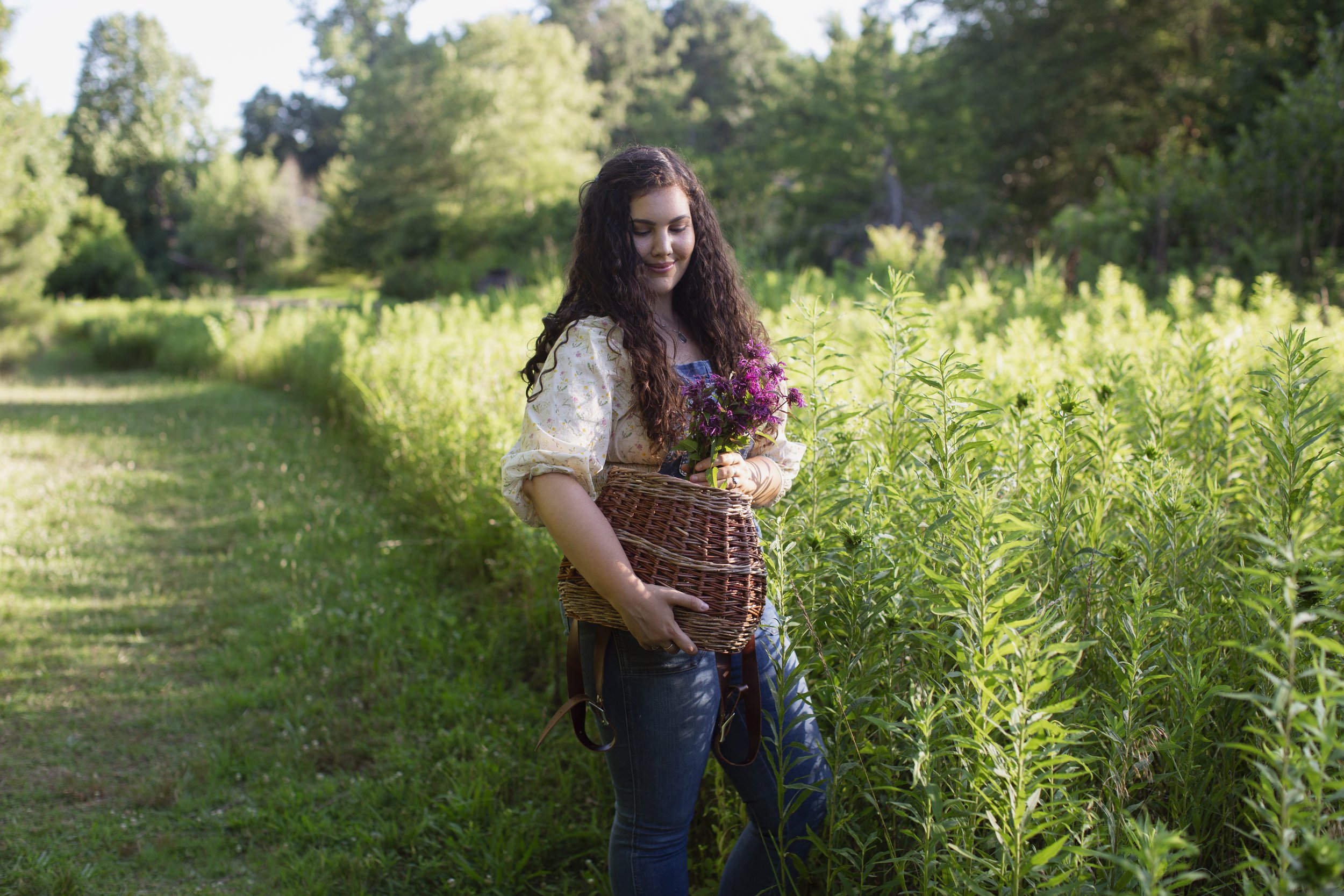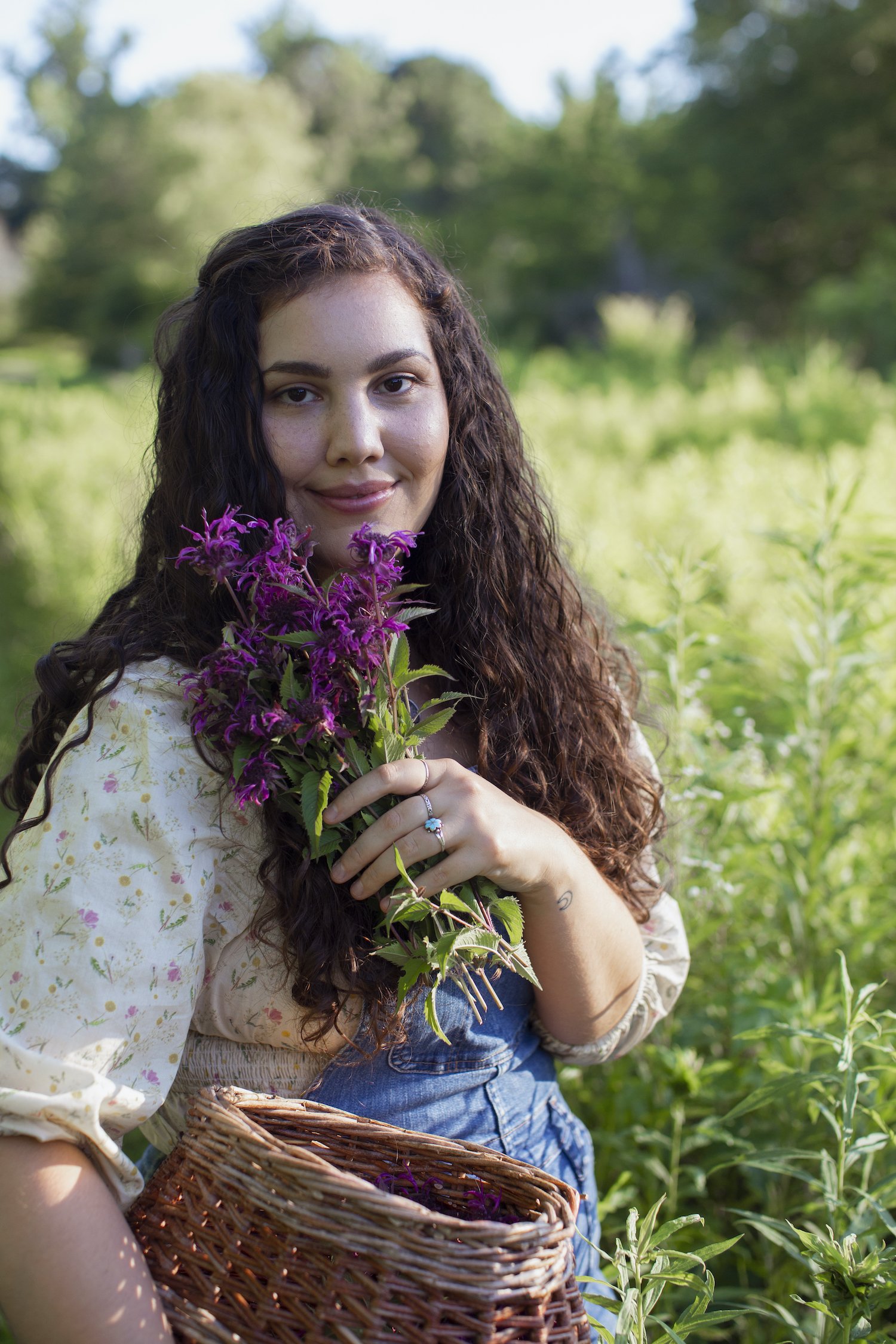Plants and Planets with Sarah Corbett
I am honored to share some of the wisdom of clinical herbalist, non-diet nutritional therapy practitioner, and traditional astrologer, Sarah Corbett. She is the founder of Rowan + Sage, where she shares handcrafted astrologically-aligned herbal products, works with clients in her clinical practice, and guides others on their plant path through educational programs and mentorship. Sarah’s work weaves together the old ways with the new to create powerful, evidence-based offerings that bring forth ancestral herbal wisdom with a touch of magic and mysticism.
I wanted to know more about the cosmic-plant connection and she so generously shared a bit of her knowledge with me. Enjoy!
Who are your ancestors and on what land do you live?
I am a first-generation Bukharian-American; my mother’s family emigrated to the United States as refugees from the former USSR, though we are from Uzbekistan and the surrounding lands of Central & West Asia. My father is a settler and his family has been in the southeast United States for 400 years, migrating from Scotland over the centuries. I grew up on the lands of the Muscogee and Cherokee, and currently live on Muscogee land in so-called Atlanta, GA.
Can you describe what the core philosophy and principles of astro herbology are?
I must first preface this by sharing that I teach a relational approach to astroherbalism, which informs how I define it. Relational astroherbalism is the practice of engaging with the inherent connections that exist between the earthly and the celestial. The basic premise of astroherbalism is that planets have a unidirectional relationship with plants – plants are expressions of the nature and virtues of the planets. Plants help us to access the virtues of planets in an embodied way, as we can see them, touch them, grow them, and imbibe them in the here and now. Instead of contemplating the sphere of Venus and imagining what Venus describes based on ancient texts and astrological delineations, one can learn about what it means to be Venusian from yarrow or rose directly. Thorns teach us about Mars, nutritive oats of the Moon, and so on and so forth. Relational astroherbalism facilitates an embodied approach to both plants and planets while helping us to form relationships with both.
How is practicing herbalism in accordance with the cosmos linked to your own culture and ancestry?
While astroherbalism is not a practice with a clear linear history, it has thrived in Central, West, & South Asia, North Africa, and the Mediterranean since it first began in Mesopotamia. Some of the first textual evidence we have describing people's observations of the influence of heavenly bodies on plants and other forms of medicine comes from Babylon in the first half of the second millennium BCE, though astrological medicine was likely already known in this region before this time. Astrology grew from the agricultural cycle of Mesopotamia – it is a land-based, relational calendar that bridges earth & sky.
People often see astrology as this new age typology that is limited to a personality-type analysis. But to the peoples of the SWANA (Southwest Asia & North Africa) region, it was a system embedded into ritual life, medicine, agriculture, and other sciences. We would not have the astrology we have today without the innovations that began in Mesopotamia and continued to develop throughout Persia and the Islamicate world long before it was ever brought west to Europe. Many astrologers in these regions were also physicians and herbalists – some of the most famous of them are from the same cities and provinces as my family! Approaching astrology in a relational way and including plants in that practice has always been a part of my people’s worldview and legacy.
Can you give an example or two of an herb and their associated planet? How can you tell this herb is associated with that planet and how does it inform how you work with that particular herb?
Identifying the planetary rulers of plants is a complicated and in-depth process that requires assessing the plant from a holistic perspective. Some of the things we consider when exploring planetary rulership include the plant’s energetics, tastes, actions, tissue state & organ system affinity, colors, morphology, healing virtues, habitat, and historical/cultural perspectives.
It’s not as simple as saying that roses are connected to love, love is connected to Venus, so rose is an herb of Venus. Rose is an herb of Venus and we can see its ability to fortify the emotional heart while connecting us to pleasure as part of its Venusian quality, but its flowers also share visual characteristics of Venus in its coloring, it prefers to grow in Venusian environments, the primary quality of rose is relaxing & astringent, it is sweet and astringent in taste, and its herbal actions fall under Venus’ purview.
Another example is nettle, which is an herb of Mars. Martial plants impact vitality, improve physical body awareness, stimulate the immune response, and have an affinity for the immune, endocrine, musculoskeletal, and circulatory systems. They tend to have serrated or jagged leaf edges; sharp thorns or pointedness, or in the case of nettle, stinging hairs; they are tenacious and take over the areas they grow in; can be salty and mineral-rich; and may be stimulating, rubefacient, alterative, nutritive, and circulatory stimulant in action. These are all qualities we can see clearly in nettle.
Understanding the planetary rulers of plants helps me to see the plants through more complex and clear language. When I’m having a particular experience and wish to call on an herb for aid, I can ask myself which planetary virtue may be most healing at this time. Do I need the sharp, protective quality of Martial nettle? How will that feel in the long term? We as herbalists know that nettle can be irritating and drying after long-term use without the addition of other herbs to balance its energetics – surely we can only hang out with the warrior for so long before we wish to find more soothing support. There’s much more to all of this, but I hope this helps you begin to see what’s possible when we work with plants in this way.
Do you observe any relation between the plants and planets with the zodiac in your practice?
A common misconception in astrology is that zodiac signs rule things or experiences – this responsibility is exclusive to planets. Zodiac signs describe areas of life, or from a physical astrology perspective, various parts of the body. For example, there are two signs ruled by Mars: Aries & Scorpio. Aries describes the head, eyes, upper jaw, our febrile mechanism, blood, and iron. Scorpio governs the lower digestive system, specifically the colon and rectum, as well as reproductive organs like the prostate, the pelvis, our sweat glands, and aspects of the endocrine system that are innervated with reproductive health. Nettle is a plant that tends to mirror these Martial plants in its growing cycle. The restorative, blood-building leaves are ready to harvest in springtime Aries season, and the roots (which are often used for prostate health) are ready to dig in Scorpio season come autumn. This is one very poignant example of how we can see astrological cycles and planetary qualities at work here on Earth. I’m constantly in awe of the plant-planet connections I witness throughout the zodiacal year, and these observations are the core of my work inside of our program Seasonal Herbcraft, where we get to know the plants through the lens of the zodiac and planetary rulership.
Besides your wealth of knowledge, what sources of inspiration do you draw from when creating herbal formulas?
I love to create simple herbal formulas! I usually base my formula on an herb pair or triplet that’s focused on supporting the concern at hand combined with a driver that helps to bring those herbs to the organ system in need of aid and a corrigant to improve the taste or harmonize the energetics of the formula to be more specific for the person I’m working with. My formulas usually include between 3-7 herbs in total, though I’ll sometimes add more to things like cordials and syrups. I’m very inspired by Unani Tibb and Persian traditional medicine formulation strategies, as well as simple kitchen wisdom passed on by my grandparents. When I’m working with someone directly through an astroherbal lens, I may also work with astrology as a way of narrowing down the final herbs I select for them. We’ve all had the experience as herbalists of talking with someone about their health experience and notating several herbs that come to mind in the margin of our notes. I’m always working to find the most specifically indicated plant for someone so that they can really build a relationship with that one herb, and astrology can help me whittle my long list of ideas down to a more specific formula for them. I must note that astroherbalism isn’t a replacement for solid clinical skills – it is more of a secondary lens that can help us refine our strategy.
Do you have any simple rituals or tips for folks to start living and working with herbs more in rhythm with the cosmos?
Begin cultivating an awareness of the seasons and how plants shift in alignment with them. Then layer in the cycles of the two most tangible “planets” in the cosmos for us here on earth: the luminaries, our Sun and Moon. While not planets in an astronomical sense, these celestial lights have reliable cycles that are easy to observe each day and night. The Sun’s cycle demarcates our seasons and of course, has a direct relationship with the life cycles of plants here on Earth. The Moon moves quicker than the Sun and can give us more day-to-day information, especially about our experience of being in a body and how to support our needs.
When I first started my embodied astrology practice, these were the only planets that I worked with. I kept journals for years where I notated which plant was blooming now and what was happening astrologically that day, or how I was feeling and what herbs helped along with notes on what sign the Moon was in, etc. These journals helped me create a living personal almanac of the land around me and how I experience living with this land. The ritual is to spend time with the plants, every day, to quiet your mind and connect with them on their level. Plants are just as alive and filled with personality as humans are – but they communicate differently than we do. Slowing down to the pace of plants and opening our hearts and minds to hear their stories is an ongoing practice of expanding our senses. It may not come naturally to folks when they first try it, but get out on the land every day and see what begins to grow within you in time.
Which herbs are you feeling called to work with right now?
Now that the seasons are turning to autumn, I’m walking the field of goldenrod and aster daily, waiting to see their beautiful blooms. Goldenrod is always a favorite for me at this time of the year, and it’s also the first plant that taught me astroherbalism. Many years ago, I was in a field of goldenrod and had a wave of knowing come over me – this was an herb of Venus. I didn’t know why, or how, but I knew this was true. After that experience, I began to dive deeper into astroherbalism so that I could understand why it was an herb of Venus, which helped me to develop the system I teach to my students now, ten years later.
You are also an advocate for decolonizing herbalism, are there any messages you have for folks to help them be more aware of how they work with, respect and enjoy the natural world and the people who are interwoven within it?
Oh yes, of course. First, really identify what your values are around this and then try to connect with teachers and colleagues who share those values. We don’t want to put ourselves in an echo chamber, but it is hard to learn herbalism from someone who isn’t invested in decolonizing this practice if that’s a core value you hold. Especially considering how much oppression and violence is wrapped up in the effects of colonization. So much of “western herbalism” is built on theft and cultural erasure, and unless someone is openly naming that and working to deconstruct it, it’s likely that you as a student will either learn to uphold and perpetuate that violence or will be harmed directly. I don’t wish that on any student of the plants.
I would also encourage folks to try to learn from lots of different teachers who come from different backgrounds and cultural perspectives. Our global herbal heritage is vast – there is no one way to practice herbalism. Learning from many teachers helps to deepen our own understanding of how humans have always built relationships with plants, expands our ability to hold many different truths about how to work with plants, increases our capacity to cultivate relationships with other human teachers, and directly combats the tendency to put teachers on pedestals. There are a handful of teachers who are essentially worshipped in a cult-like way in our field. It’s dangerous to link our entire concept of herbalism to one specific teacher, and if your teacher is discouraging you from learning from others, that’s a red flag.
We can also decolonize our herbalism by learning directly from people who are connected to their lineages. For example, instead of reading a book written by a white settler about a particular Indigenous tribe's use of herbs, as the writing will ultimately be filtered through the lens of their whiteness, what if you instead built a relationship with those Indigenous people and learned directly from them? Approach people with humility too – many groups have practices and teachings that are closed to outsiders. We are not entitled to know everything and we should be mindful not to approach people with an extractive mindset. But ultimately, decolonizing herbalism isn't just about learning accurate history or connecting to our ancestral herbal relationships – that's a part of it. Decolonizing herbalism requires us to material divest from oppressive systems and support the people who are most affected by colonization and white supremacy.
Are there any exciting projects you’re working on right now? Where can people find you to support you and your work?
Oh always working on finding time to write a book on astroherbalism, which I have no definitive date for! But I also have some really beautiful online programs that are self-paced and open enrollment, and I invite folks to check those out:
Herbaria Membership Program – Our community-driven monthly herbal membership and digital library for accessible & expansive education on the virtues of plants. https://www.rowanandsage.com/herbaria
Vitalist Herbcraft – This foundational class introduces folks to the key aspects of herbalism that every plant person needs to know to move forward on their herbal journey. https://www.rowanandsage.com/vitalistherbcraft
Seasonal Herbcraft – A year-long exploration of relational astroherbalism through the elements, zodiacal wheel, and seasons of the year. https://www.rowanandsage.com/seasonalherbcraft
Kitchen Herbcraft – A self-paced online program that teaches you how to make simple, effective, and incredibly potent herbal preparations at home. https://www.rowanandsage.com/seasonalherbcraft
We also host culturally & bioregionally-rooted teachers for guest workshops each month – you can check out our upcoming events and access past replays here: https://www.rowanandsage.com/upcoming-events
Connect with Sarah and learn more about her work via her website www.rowanandsage.com or on all social media channels @rowanandsage.




